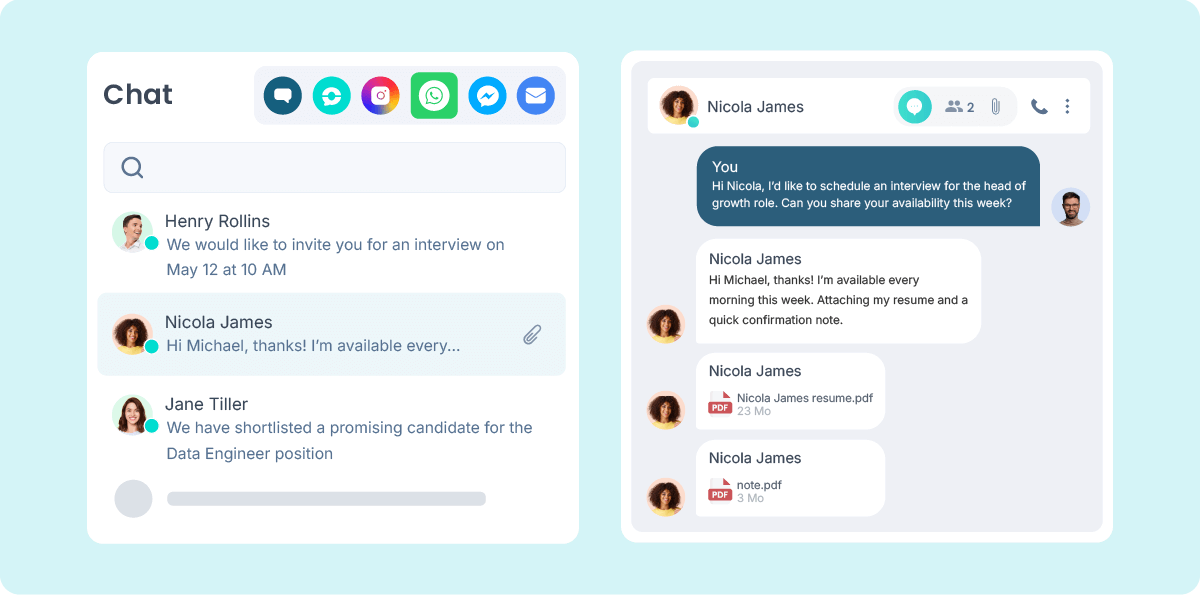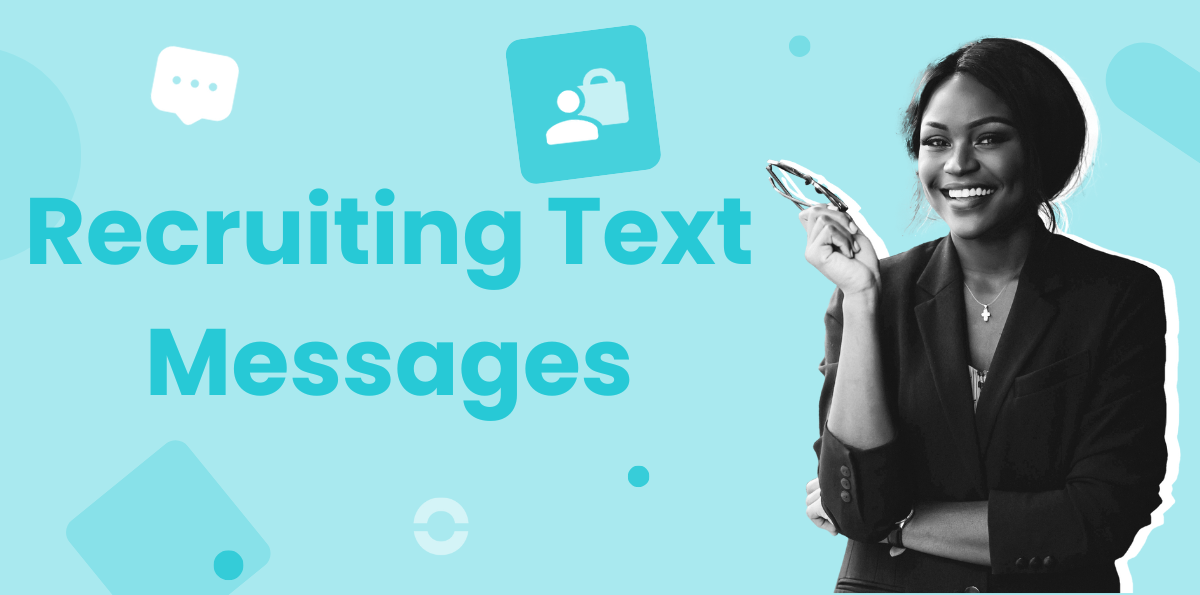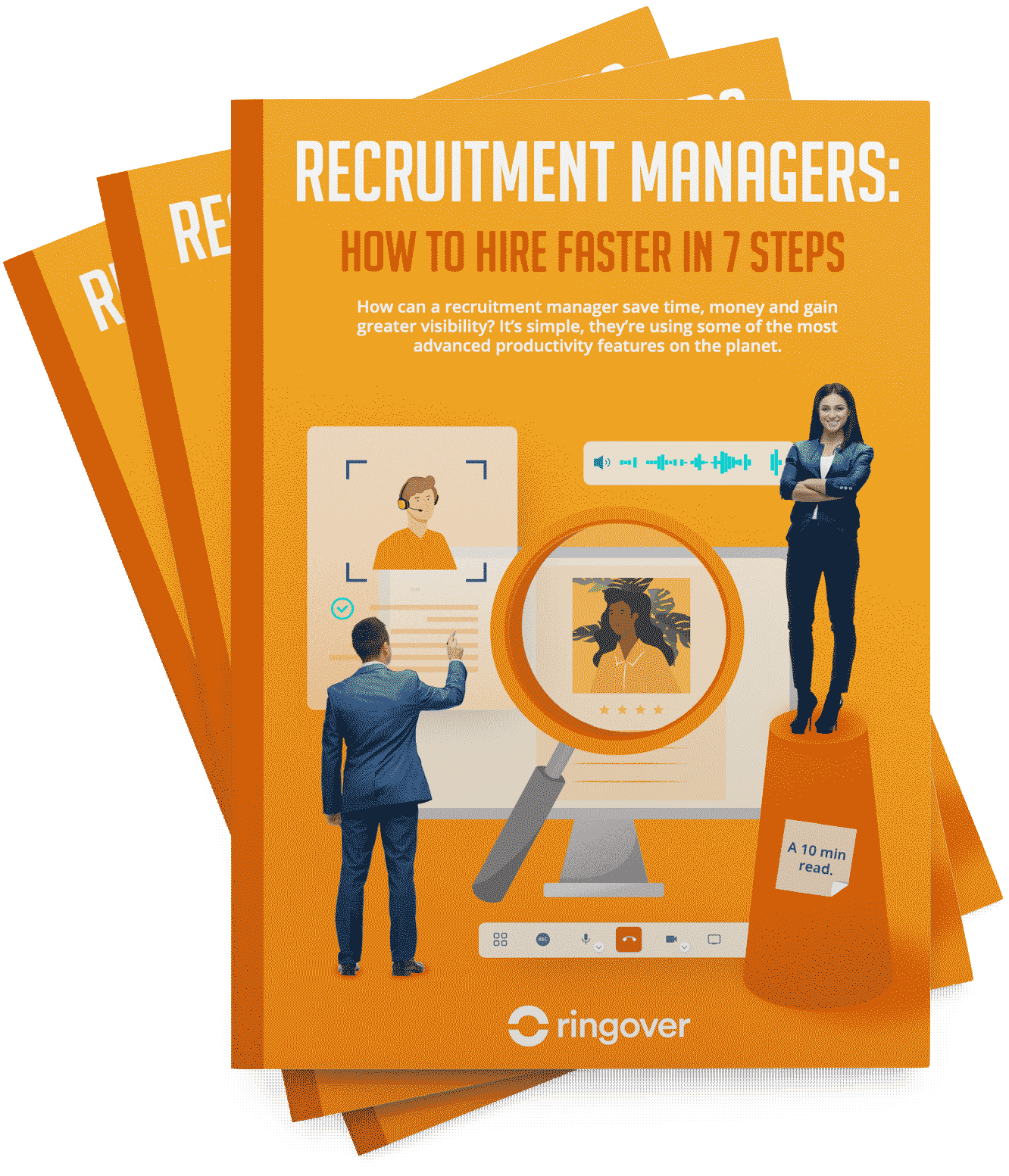Summary
Text messages have a clear advantage over traditional communication methods like emails because they arrive directly to candidates' cellphones–usually in their pocket, or even their hand! This advantage positions texting as an invaluable asset for recruiters, streamlining the hiring process from the initial contact, through interview scheduling, to extending job offers.
Therefore, sending recruiting text messages effectively can forge a strong bond with candidates, instilling a sense of value and engagement throughout the recruitment journey and improving the overall candidate experience. But what exactly constitutes a recruiting message? A recruiting message is a clear, concise, and personalised text tailored to the candidate's specific stage in the recruitment process.
You'll need to follow certain best practices to send clear, professional, and personalised messages to each candidate and use a VoIP service like Ringover, which provides omnichannel contact centre software. To simplify writing text messages, we've put together 10 recruiting text message templates that you can apply to simplify recruiting outreach. We'll also look at the unique benefits of texting for recruiters, the aforementioned recruiting text message best practices, and answer common questions about recruiting through text messaging.

10 Recruiting Text Message Templates for Communicating with Candidates
1. Updates in the Recruiting Process
It's vital to keep candidates updated on their application status to maintain their interest and trust.
Recruiting text message example:
“ Hi [Candidate Name], this is [Your Name] from [Company]. Just wanted to let you know that we have received your application and are currently reviewing it. We will get back to you within the next [timeframe]. Thank you for your patience. “
2. Prescreening Procedures
Prescreening is an important step in narrowing down the candidate pool. Here's how to inform candidates about what comes next.
Recruiting text message example:
“ Hello [Candidate Name], this is [Your Name] from [Company]. We are moving forward with the prescreening process for the [Job Title] role. We will conduct a brief phone interview to discuss your qualifications further. Please let us know your availability for the next [timeframe]. “
3. Candidate Experience Surveys
Gathering feedback from candidates is essential for improving your recruitment process and the overall candidate experience.
Recruiting text message example:
“ Hi [Candidate Name], thank you for participating in our recruitment process. We value your feedback and would like to hear about your experience. Please take a moment to complete this short survey: [Survey Link]. “
4. Scheduling Meetings
Streamline the process of scheduling interviews or meetings through text messages using a recruiting automation software. You can even schedule messages to ensure they get sent at the right time to the right person using a tool like Ringover.
Recruiting text message example:
“ Hi [Candidate Name], this is [Your Name] from [Company]. We would like to schedule an interview for the [Job Title] role. Please choose a time that works for you from the following options: [Calendar Link]. Looking forward to speaking with you! “
5. Automatic Responses to Candidate Questions
Providing quick answers to common candidate questions can save time and enhance candidate satisfaction.
Recruiting text message example:
“ Hi [Candidate Name], thank you for your inquiry. Here are some answers to frequently asked questions about the [Job Title] role: [FAQ Link]. If you have any more questions, feel free to ask. “
6. Follow Up After Events
Following up with candidates after job fairs or other recruitment events is key to keeping them engaged.
Recruiting text message example:
“ Hi [Candidate Name], this is [Your Name] from [Company]. We met at the recent job fair and wanted to follow up on your interest in the [Job Title] role. Are you available for a quick chat this week to discuss further? “
7. Job Offer Notifications
Notifying candidates about job offers is a critical step that should be handled with clarity and enthusiasm.
Recruiting text message example:
“ Hi [Candidate Name], we are thrilled to inform you that you have been selected for the [Job Title] role at [Company]. Here are the details of your offer: [Offer Link]. We look forward to welcoming you to our team! “
8. Onboarding Reminders
Reminding new hires about their onboarding process ensures a smooth transition into the company.
Recruiting text message example:
“ Hi [Candidate Name], this is [Your Name] from [Company]. Just a reminder that your onboarding process begins on [Start Date] at [Reporting Time] in [Location]. If you have any questions, please don't hesitate to reach out. “
9. Document Verification
Efficiently request and confirm the receipt of necessary documents via text.
Recruiting text message example:
“ Hi [Candidate Name], this is [Your Name] from [Company]. We need to verify some documents as part of our hiring process. Please send us your [document type] at your earliest convenience. Thank you! “
10. Post-Interview Feedback
Providing feedback after an interview, whether positive or negative, is important for maintaining a positive candidate experience.
Recruiting text message example:
“ Hi [Candidate Name], thank you for taking the time to interview with us for the [Job Title] role. We appreciate your interest and will be in touch soon with our decision. If you have any questions, feel free to reach out. “
Why Texting is Useful for Recruiters

Faster Response Times and Increased Engagement
Text messages are opened at a rate of 98%, as compared to the 21% open rate for emails. This immediacy allows recruiters to move candidates through the hiring funnel quickly, reducing the overall time-to-fill for open positions.
When using Ringover's texting service, you'll have easy access to your professional text exchanges with candidates and clients. The texting logs are stored in Ringover's user-friendly interface, allowing you to write and send texts from any Internet-connected device. You can even set up text message campaigns which send messages automatically to many contacts!
Enhanced Candidate Experience
Texting enhances candidate relationship management by providing a more personal and convenient mode of communication. Candidates often find it less intimidating to respond to texts compared to phone calls or emails, which can lead to richer and more comfortable conversations. This approachability and transparency can significantly improve the candidate's perception of the company, even if they do not secure the job.
And for recruiters, having a leading software for recruiting communication like Ringover makes providing an exceptional candidate experience easier than ever. For example, Ringover integrates with popular CRMs like Salesforce, Hubspot, and more. Connecting Ringover to these software creates an automatic data exchange–not only will your communication history be accessible on the CRM interface, you can send text messages from your CRM too! Recruiters have access to the valuable information stored in the CRM, and enjoy improved productivity because they don't have to toggle between applications.
Versatility in Communication
Text recruiting is not limited to just sending job descriptions. It is a versatile tool that can be used for various stages of the recruitment process, including scheduling interviews, sending reminders, providing updates on application status, and even facilitating the onboarding process. This versatility makes texting an all-encompassing solution for recruiters.
Once you begin leveraging a top-rated recruiter communication tool like Ringover, you'll be able to send text messages from both individual and shared numbers. With an individual number, candidates can contact a specific recruiter directly, creating a close relationship. On the other hand, having a shared number and text message inbox allows recruiters to respond to candidates as quickly as possible with personalized messages. Either way, recruiters will communicate efficiently and effectively with candidates, who will appreciate having a direct line of communication during the hiring process.
Scalability and Cost Efficiency
Text recruiting allows recruiters to scale their communication efforts easily, making it ideal for bulk hiring or seasonal recruitment needs. Additionally, texting is generally more cost-efficient than making phone calls, especially when recruiting internationally. This scalability and cost-effectiveness can be a significant advantage for companies with high recruitment volumes.
Broader Reach and Personalization
Text messages have a broader reach compared to emails or phone calls, as most people read their texts promptly. Using this mode of communication allows you to differentiate yourself by incorporating more personalization in recruiting and ensuring your message is seen as soon as possible.
Moreover, after incorporating Empower by Ringover into your recruiter communication toolbox, you'll be able to take personalization to the next level. Empower automatically transcribes and summarizes all calls with clients and candidates, transforming each conversation into a searchable and easily digestible resource for recruiters. Having personalized interactions with candidates and clients is easier than ever, as Empower makes it possible to understand the communication history of any client or candidate rapidly.
5 Best Practices for Recruiting Text Messages
1. Personalization and Clear Identification
Personalization makes candidates feel appreciated and engaged. Use their names and customize the message content to align with their interests and skills. Moreover, clearly identifying yourself and your company in each text is vital. This clarity fosters trust and confirms for candidates who's reaching out to them.
One of the easiest ways to incorporate personalization into your messages is by integrating your CRM or ATS with a text messaging software like Ringover. Once Ringover's connected to a complementary hiring management software like Bullhorn or Vincere, you'll have key candidate and client information side-by-side communication tools like texting, as well as click-to-call and video conferencing. Referencing previous conversations and incorporating previous evoked needs or requirements allows you to prove a high level of attention to detail. Providing a high level of service has never been so easy!
2. Keep Messages Short and Professional
Texts must be brief and straightforward. With the character limit in mind, it's critical to communicate your message efficiently without superfluous words. Always use a professional tone, avoid slang, and meticulously proofread your messages. A concise and clear approach aids in quick comprehension and fosters a positive image of your company.
3. Respect Candidates' Time and Time Zones
The timing of your messages can significantly impact their reception. Aim to send texts during standard business hours to respect the candidate's personal time. Considering time zones is also important to ensure messages arrive at a suitable moment. Inquiring about candidates' preferred times for contact can further optimize message scheduling.
4. Obtain Permission to Text Candidates
Before you initiate contact via text, gaining the candidate's consent is essential. This practice is not only respectful but also adheres to legal standards. Consent can be obtained through the job application process or by directly asking candidates if they are open to receiving texts from your organization. This step ensures you respect individual privacy and follow applicable laws.
5. Encourage Replies and Respond Promptly
Text messaging is inherently interactive, so prompting candidates to reply and pose questions. Timely responses to these interactions are important for maintaining engagement and ensuring a smooth recruitment experience. This prompt communication underlines your commitment to each candidate's journey.
In Conclusion
In conclusion, incorporating text messaging into your recruitment strategy significantly enhances your ability to attract and convert top talent. Texting not only offers higher response rates and faster communication but also provides a more personalised candidate experience than traditional methods such as email and phone calls.
To fully leverage the advantages of texting, use a well-rounded recruiting tool like Ringover, which allows you to schedule messages, integrate with software like Recruit CRM and Avionté, and more. If you're ready to add texting to your recruiting strategy, start your free Ringover trial today!
Recruiting Text Message FAQ
Do recruiters send text messages?
Recruiters increasingly use text messages as a primary mode of communication with candidates. Text messaging has become a popular tool in the recruitment process due to its high response rates, convenience, and the preference of many candidates for this form of communication. Recruiters use texts to send job alerts, schedule interviews, provide updates on application statuses, and even extend job offers.
How to tell if a text from a recruiter is real?
To determine if a text message from a recruiter is genuine, use this checklist.
- Check if the message includes the recruiter's name, the company name, and a clear purpose for the communication. Legitimate recruiters will typically introduce themselves and specify the job role or company they represent.
- Ignore messages that ask for sensitive information such as passwords or financial details, as these are likely scams. If you are unsure, you can always respond by asking for more information, verifying the recruiter's identity through a quick internet search, or contacting the company directly.
- Disregard messages telling you to pay for supplies or training. If the recruiter mentioned the possibility of purchasing supplies, contact them via other means to double check payment is required.
- Complete an online search to verify if a recruitment agency is legitimate or known to be fake.
- If the details about the job offer are unclear or incomplete, request further information, such as an online post on the company's website. Proceed with caution, especially if the recruiter asks for personal information.
How do you write a recruiter message?
When writing a message to a recruiter, it is important to be clear, concise, and professional. Here are some tips:
- Introduce Yourself: Start by introducing your name and the position you are interested in.
- State Your Purpose: Clearly state why you are contacting the recruiter, whether it is to express interest in a job, ask about the status of your application, or schedule an interview.
- Provide Relevant Information: Include relevant details such as where you found the job listing or who referred you.
- Show Enthusiasm and Interest: Express your enthusiasm for the role and the company.
- Include Contact Information: Provide your contact details, such as your phone number or email address, to make it easy for the recruiter to get back to you.
What should I text a recruiter?
When texting a recruiter, keep your messages short, professional, and direct. Here are some scenarios and how you might handle them:
- Expressing Interest in a Job: "Hi [Recruiter's Name], my name is [Your Name]. I am interested in the [Job Title] role at [Company]. I found the job listing on [Job Board/Source] and believe my skills and experience make me a strong fit. Can we schedule a time to discuss this further?"
- Following Up on an Application: "Hi [Recruiter's Name], this is [Your Name]. I am following up on my application for the [Job Title] role I submitted [Number of Days/Weeks] ago. Could you please provide an update on the status of my application?"
- Scheduling an Interview: "Hi [Recruiter's Name], this is [Your Name]. I am available to schedule an interview for the [Job Title] role. Here are my available times: [List Specific Times]. Please let me know which time works best for you."
Published on January 14, 2025.



